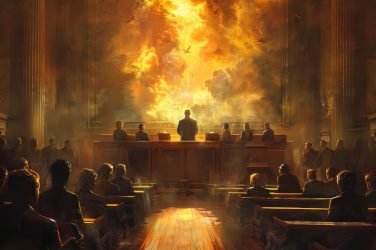
By Mike Mazyck
“Doesn’t it just make you so grateful?” That was the question asked to me countless times after coming home from last year’s mission trip to Kenya. As I shared stories of extreme poverty and sickness, horrific living conditions, and countless orphaned children, there was always one question that would conclude the discussion. It was usually asked in a rhetorical type of manner, where no response was expected or needed. They would shake their head, and some variation of those words would come out of their mouth: “Doesn’t it just make you so grateful?” I would nod my head in affirmation, unable to articulate my true feelings. Silence was easier than trying to find the words.
The truth is that the question irritated me. I was still trying to sort out my feelings, and everyone kept asking me the same question. I know it was a reasonable one, but nevertheless, it annoyed me. I felt like they expected a certain answer. Like I was supposed to come back with this ecstatic feeling of gratitude that put a smile on my face because of all the things I have been given in this life, happy and “grateful” that I was not living a life like those people. But that is not what I felt. I had no smile on my face. So, when I would respond with that nod of affirmation they were looking for, I could see the confusion in their eyes. Clearly, the countenance of my face had betrayed me. No, gratitude was not the emotion I was experiencing. At least not the type of gratitude they were imagining. While they were asking me about my gratitude, I found myself wrestling with different questions altogether.
In Kenya, I met a family of six who slept on a hard floor in a filthy mud hut, no larger than my bathroom, with holes in the roof. Every night, they would bring their chickens and cow inside the “house” while they slept, otherwise, they would be stolen. As I observed this precious family, I couldn’t get the questions out of my head: Why? Why am I me? Why are they them? Why am I not them, and they not me? They did nothing to deserve this life. I did nothing to deserve mine. Yet here they are. And here I am. Why Lord?
Silence was the only answer I would receive.
Not long after that, we arrived at another village. An impoverished family stepped out of their mud hut and handed us their 16-year-old daughter’s twin babies to bring back to the orphanage. They were less than three months old. There was no father to help provide. While no one spoke of what had happened, it was presumed that the young girl had been raped. The family had no means to provide for these precious twins. As I stood there with the babies, under the hot African sun, looking at all the little mud huts that surrounded me, watching as their mom — still a child herself — signed papers and handed over their birth certificates, I couldn’t help but notice the grandfather silently observing it all from a distance. And once again, I wrestled with those questions: Why? Why is that not me and my family? Why did You choose to put them here and me there? Once again, there was only silence.
My trip to Kenya is not the only time these questions have surfaced. Over the last several years, I have begun to read through the writings and biographies of many of the great saints that have gone before us in generations past. This has been one of the most spiritually fruitful things I have ever done in my life! However, it has also brought me to an unfortunate and sobering conclusion: This life has been unspeakably horrific for a far greater number of people than I had ever realized. The fact is that for thousands of years now, men, women, and children have lived out their lives on this earth in great suffering and cruelty. This life has brought extreme poverty, starvation, horrifying disease, and intense pain to billions of humans throughout history. Entire generations of souls across this earth have lived under ruthless and evil dictators, men who have carried out some of the most gruesome and cruel forms of torture the mind could ever fathom. I now fully comprehend what those wise men meant when they wrote, “You will never understand where you are until you understand where you have been.”
It has now become apparent to me that the life I am currently living is not a normal life. It is not the life that has been common to man for thousands of years. I am living in an unusual place in an unusual time. As I pondered these things, I found myself coming back to those same questions: Why? Why was I not born in one of those past generations? Why am I here, in America, in 2023? Why am I not suffering right now? Why do I enjoy a life of luxury, comfort, and convenience while so many souls before me have suffered so terribly? Why am I not sleeping with my family on the cold, hard floor of an 8×10 mud hut in Kenya right now?
You may think it’s pointless to ponder questions like these, but I have found the opposite true. I have realized that sometimes, much fruit comes from pondering difficult questions that cannot be answered. And now, as I reflect on all the times I was asked, “Doesn’t it just make you so grateful?” I guess the answer is Yes and No. I suppose it depends on how you define the word grateful.
In Dietrich Bonhoeffer’s Christian classic, The Cost of Discipleship, he distinguishes between cheap grace and costly grace. I would make the same distinction between cheap gratitude and costly gratitude. Cheap gratitude is what I believe we have come to accept today in America (and even the church). It’s a gratitude that is about us and our feelings, about us feeling good for what we have been given, and then going on about our day. It requires nothing from us. No response is necessary. It is superficial and self-centered. It puts a big smile on our faces as we think about how “blessed” our life is. Cheap gratitude makes for a great Facebook post but has precious little to do with true spirituality.
Costly gratitude, on the other hand, is altogether different. It is not concerned with smiles and superficiality. Costly gratitude is sobering. Costly gratitude comes with great responsibility! Costly Gratitude evokes a response, an unction in your spirit to do something. Costly gratitude knows that a choice must now be made; a life must be laid down — a cross must be carried. Because “to everyone whom much has been given, much will be required.” (Luke 12:48)
“Doesn’t it just make you so grateful?”
I now know why I could never find the words, why silence was easier.
It’s because words are cheap. I know in my heart that mere words will not suffice. The only way to truthfully answer that question is by my actions. My life must reveal that I am grateful!
To read more of Mike’s writing, visit his blog at MikeMazyck.com










